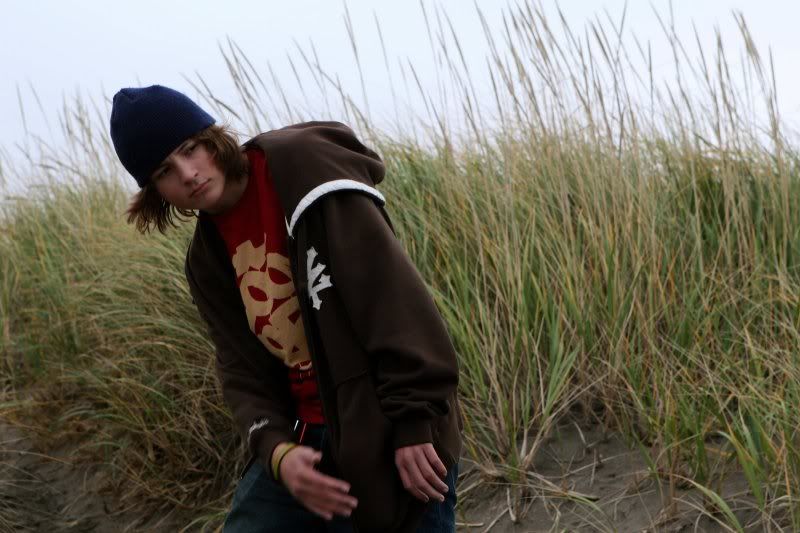
Gus Van Sant has never shied away from his enduring love affair with the young male misfit. Whether it be River Phoenix fulfilling fantasies as a hustler in "My Own Private Idaho" or Michael Pitt quietly marching to his death as a put upon rock star in "Last Days", Van Sant's vision has always been filtered through the eyes of boys becoming men and all of the confusion, ennui, and malaise that stirs through their dreamy days of youth. A sense of plaintiveness paired with an emotional inertia persists in these young men's lives. Calling them a modern Peter Pan seems too easy, but there is a great resistance to grow up, gain responsibility, or accept convention, which in a way could describe Van Sant himself. His heroes are bright young things pining for meaning, but very much rebel rousers of their generation, which belies the fact that Van Sant is approaching his sixties. An accidental death in his latest impressionistic opus, "Paranoid Park", is besides the point, rather it's the way the skater punks involved react, or don't, that interests him and the audience.
"Paranoid Park" could be viewed as a part of a loose tetralogy of films that finds the archetypal Van Sant anti-hero in search of something or appear to be literally lost, all the while filmed in a very hypnotically slow pace. "Elephant" was essentially a collection of tracking shots following the day in the life of a school effected by a student shooting spree, "Last Days" held the frame for an eternity to gaze upon its Kurt Kobain-esque subject having an exchange about a telephone book, and "Gerry" followed two men in a desert for an entire film. These are not always the easiest to watch films. They are so stripped of visual tricks and choppy editing that it's almost an exercise in tolerance to take in such a minimalist approach. "Paranoid Park" utilizes a similar method, but in this film Van Sant and cinematographers Christopher Doyle and Kathy Li loosen up a bit with handheld cameras and rigorously spend a great deal of time re-examining moments in the hero's mind. They're impressions of moments that plague and obsess him. I can't remember seeing a film in a long while that questioned morality through it's visual schema, but Van Sant wants to immerse his audience in the mind of this kid who is neither good or bad, guilty or innocent, naive or calculating. He's just a teenage boy floating from school to the skate park to the beach to his bedroom.
Flight and its many implications are a clear theme in the film. The ability to fly away from the teenage wasteland that can be high school, dating, peer pressure, and the constant quest to achieve coolness is articulated very delicately and persuasively in "Paranoid Park." Striking slow motion shots of skateboarders in mid-flight in the pale air of a Portland skate park as if a part of a modern ballet resonate and leave your cinematic appetite with a breathless feeling. It's all very intoxicating but Van Sant is in no way the choreographer, just the quiet observer that finds a kindred spirit in his subject. Van Sant's alter-ego, Alex (Gabe Nevins), looks on with such delighted reverie at the more experienced skaters. In some ways you feel like Van Sant was the last kid picked for dodgeball. These moments and many others conjure up comparisons to Hedi Slimane images, in their gritty cool and constant surveying of the power and pull of youth. However, it all becomes much more morally and psychologically complex when Alex becomes implicated in an accidental murder of a train yard security guard. How does he react? How doesn't he? Is he different or the same? Are we all remorseless coldblooded killers or innate liars? We never really know, and Van Sant wouldn't want us to know either.
Existing as an American teenager in the 21st century is an unusual feat. The generation of post-Clinton, post-Napster, post-Columbine, and post-9/11 could be easily summed up in one gesture: a shrug. The collective ambivalence and apathy these teenagers exudes answers those questions that the audience wonders about how Alex reacts to the murder. Alex's Antoine Doinel-like vague and unflinching features are a perfect fit for a story about someone who we don't know much about and are never told explicitly how he's feeling or thinking. To ensure "Paranoid Park" isn't an out of touch trick disguised as an arthouse vehicle, Van Sant slows down the action like a modern Antonioni to allow the audience to glean some meaning from the spatial relationship between inner and outerworld of an otherwise private hero. An empty beach becomes the playground for Alex's confessional, a suburban bedroom and a horny cheerleader can't seem to rouse much feeling or truth from the hero, and a shower in the dark functions as a space to wash away the sins and regrets that come with age and consequence. Van Sant guides us to and fro into his awkward riptide of youth. We see these images out of sorts, blurred, blocked unusually, and played out repeatedly, much like a rush of memories settling into the mind. Luckily for the audience, the film does the same.
Tuesday, May 13, 2008
the lost boys
Posted by
w.
at
10:31 AM
![]()
![]()
Labels: film, gus van sant
Subscribe to:
Post Comments (Atom)



No comments:
Post a Comment